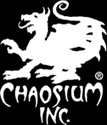
Chaosium Inc. is a publisher of tabletop role-playing games established by Greg Stafford in 1975. Chaosium's major titles include Call of Cthulhu, based on the horror fiction stories of H. P. Lovecraft, RuneQuest Glorantha, Pendragon, based on Thomas Mallory's Le Morte d'Arthur, and 7th Sea, "swashbuckling and sorcery" set in a fantasy 17th century Europe.

Glorantha is a fantasy world created by Greg Stafford. It was first introduced in the board game White Bear and Red Moon (1975) by Chaosium and then in a number of other board, roleplaying and computer games, including RuneQuest and HeroQuest, as well as several works of fiction and the computer strategy game King of Dragon Pass. The Gloranthan world is characterised by its complex use of mythology, heavily influenced by the universalist approaches of Joseph Campbell and Mircea Eliade, its sword and sorcery ethos, its long and distinctive history as a setting for role-playing games, its community development and expansion, and its relative lack of Tolkienesque influence, which is uncommon among early American fantasy role-playing games.

RuneQuest is a fantasy tabletop role-playing game originally designed by Steve Perrin, Ray Turney, Steve Henderson, and Warren James, and set in Greg Stafford's mythical world of Glorantha. It was first published in 1978 by The Chaosium. Beginning in 1984, publication passed between a number of companies, including Avalon Hill, Mongoose Publishing, and The Design Mechanism, before finally returning to Chaosium in 2016. RuneQuest is notable for its system, designed around percentile dice and an early implementation of skill rules, which became the basis for numerous other games. There have been several editions of the game.

Cults of Prax is a tabletop role-playing game supplement for RuneQuest. Originally published by Chaosium in 1979, it was republished in 2016 in PDF format as part of Chaosium's RuneQuest: Classic Edition Kickstarter.

Cities is a fantasy role-playing game supplement that was first published by Midkemia Press in 1979. The supplement was designed to be used with any role-playing game system, and provides information about using urban center as part of adventures. Midkemia published a second edition in 1980, Chaosium published a third edition in 1986, and Avalon Hill published a fourth edition in 1988 for the RuneQuest role-playing game. The various editions received positive reviews in game periodicals including The Space Gamer, Different Worlds, Dragon, White Dwarf, Casus Belli, and Games International.
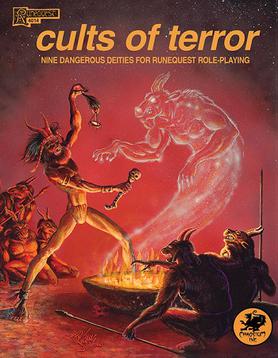
Cults of Terror is a tabletop role-playing game supplement for RuneQuest, originally published by Chaosium in 1981. The sourcebook details nine evil deities and the cults that worship them, for use in Greg Stafford's fantasy world of Glorantha.

Trollpak, Troll Facts, Secrets, and Adventures is a boxed fantasy tabletop role-playing supplement, written by Greg Stafford, and Sandy Petersen, with art by Lisa A. Free, and published by Chaosium in 1982. Trollpak is a detailed and extensive background packet for use with RuneQuest, an examination of trolls in Glorantha. A second edition was published in 1988 by Avalon Hill. Both editions received positive reviews in game periodicals including Different Worlds, Dragon, White Dwarf, The Space Gamer, and Games International.

Griffin Island is a boxed tabletop role-playing game supplement for RuneQuest. Originally published by Chaosium in 1981 as Griffin Mountain, a set of adventures set in the world of Glorantha, this edition was published in 1986 by The Avalon Hill Game Company as part of its third edition RuneQuest rules set. It was written by Rudy Kraft, Jennell Jaquays, Greg Stafford, and Sandy Petersen. Griffin Island contained role-playing material to help gamemasters design adventures in the setting. It received positive reviews in game periodicals including Casus Belli, White Dwarf, Dragon, Space Gamer/Fantasy Gamer, The Games Machine, and Games International.

Dorastor: Land of Doom is a 1993 tabletop role-playing game supplement, written by Greg Stafford, Sandy Petersen, and Ken Rolston, with a cover by Linda Michaels for RuneQuest, and published by Avalon Hill.

Glorantha: Genertela, Crucible of the Hero Wars is a supplement created by Chaosium and published under license by Avalon Hill in 1988 for the fantasy role-playing game RuneQuest.

Pavis: Threshold to Danger is a boxed tabletop role-playing game supplement for RuneQuest, originally published by Chaosium in 1983. This boxed set detailed the fictional city of New Pavis for use in role-playing adventures. It received positive reviews in game periodicals including White Dwarf, Dragon, Different Worlds, and Fantasy Gamer. The set was republished in 1999 by Moon Design Publications in a single volume with Big Rubble: The Deadly City as Gloranthan Classics Volume I – Pavis & Big Rubble. The 1983 edition was republished in 2019 in PDF format as part of Chaosium's RuneQuest: Classic Edition Kickstarter.

RuneQuest Companion is a tabletop role-playing game supplement for RuneQuest. Originally published by Chaosium in 1983, it consisted of reprints of Wyrm's Footnotes magazine articles as well as new material to expand the game rules and setting. It received positive reviews in game periodicals including Dragon, White Dwarf, Fantasy Gamer, and Different Worlds. It was republished in 2019 in PDF format as part of Chaosium's RuneQuest: Classic Edition Kickstarter.
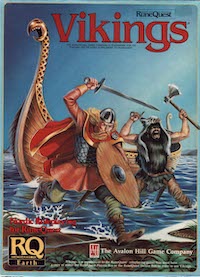
Vikings, Nordic Roleplaying for RuneQuest is a boxed tabletop role playing game supplement, written by Greg Stafford and Sandy Petersen, with a cover by Steve Purcell. Published under license by Avalon Hill in 1985 for Chaosium's fantasy role-playing game RuneQuest.

RuneQuest Monsters is a game supplement published by Games Workshop in 1987 for the fantasy role-playing game RuneQuest.

Eldarad: The Lost City is a campaign setting published under license by Avalon Hill in 1990 for Chaosium's fantasy role-playing game RuneQuest.
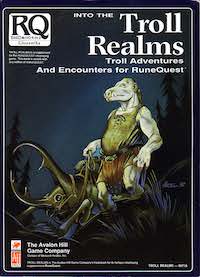
Into the Troll Realms, subtitled "Troll Adventures and Encounters for RuneQuest" is a supplement that includes adventures and material that involve interactions with trolls, published under license by Avalon Hill in 1988 for Chaosium's fantasy role-playing game RuneQuest

Land of Ninja is a supplement published under license by Avalon Hill in 1987 for Chaosium's fantasy role-playing game RuneQuest.

Snakepipe Hollow is an adventure published by Chaosium in 1979 for the fantasy role-playing game RuneQuest, then revised and republished in various editions.
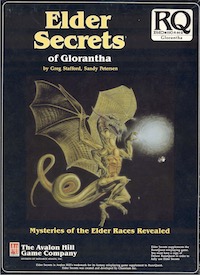
Elder Secrets of Glorantha is a 1989 role-playing game supplement for RuneQuest published by Avalon Hill.





















